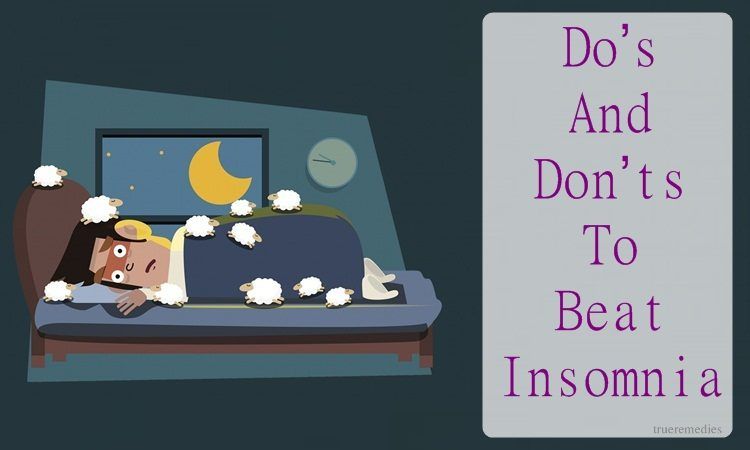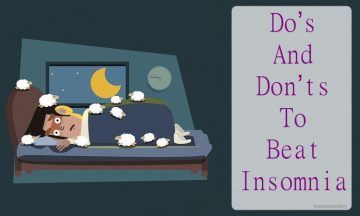Table Of Contents
Many people think that insomnia, or sleeplessness, is not too serious to care about. However, it may be the root of both mental and physical health problems you are facing. In this article, TrueRemedies would like to show you the do’s and don’ts to beat insomnia naturally that you should take into consideration.
- Top 7 Common Foods That Cause Insomnia
- 29 Best Tips To Stop Insomnia Anxiety Without Pills
- 22 Natural Solutions For Sleep Disorders In Children & Adults
Top 12 Do’s And Don’ts To Beat Insomnia And Get A Good Night’s Sleep
I. What Is Insomnia?
Insomnia is a common sleep order, especially in older adults[1]. Individuals suffering from insomnia may have trouble staying asleep and falling asleep. Insomnia is normally accompanied by sleepiness during daytime, a significant decrease in work and learning performance and a considerable impact on the quality of life. Besides, insomnia also has some bad effects on overall health and energy production in the human body.
II. How Does Insomnia Affect Our Human Health?
Quality sleep is extremely important in maintaining good health and well-being. Sleep deprivation or deficiency may lead to some serious problems in both physical and mental health. Some complications of insomnia can be:
- Lower performance in job or work
- Slowed reaction time
- Depression
- Anxiety disorder
- Poor immune system
- Risk of overweight or obesity
- High blood pressure
- Higher rate of cardiovascular disease
- Risk of diabetes
III. What To Do To Beat Insomnia
1. Take Melatonin Supplements
Melatonin may make it easier for you to fall asleep and improve the quality of sleep. A study about cancer patients with insomnia has proved that melatonin has some beneficial effects on inducing sleep and enhancing sleep patterns[2]. If you have difficulty falling asleep, take 1 to 5mg 30 minutes to two hours before bed. It is important to check with your doctor before taking melatonin supplements.
2. Drink Chamomile Tea
Chamomile has been considered as an herbal sleep remedy for hundreds of years. This herb contains anti-inflammatory and anti-bacterial content. Postpartum women in a 2015 study were instructed to drink chamomile tea for 14 days[3]. During this time, researchers found that these participants experienced less depression, fatigue and higher sleep quality.
Drink a warm cup of chamomile tea 30-60 minutes before going to bed to have a better and deeper sleep.
TrueRemedies Partner Solutions

Need a Help from the Leading Expert Online, Available 24/7?
They’re all here and ready to answer your questions online or by phone. Keep asking questions until you get the answer you need.
3. Take Lavender Oil Capsules
Lavender oil is an essential oil extracted from the flower spikes of certain types of lavender. This oil is famous for its numerous impressive benefits for health and beauty.
The results of a 2014 study demonstrated that lavender oil capsules might decrease some anxiety-related symptoms and improve sleep quality in major depressive disorder patients[4].
You can take 20 – 80 mg of lavender oil orally every day or according to your doctor’s advice. Besides, you also can drink lavender tea if you wish or absorb lavender oil though a diffuser and spray it onto pillows.
4. Practice Mindfulness Meditation
Mindfulness meditation is a mindful practice which includes concentrating on your thoughts, sensations and feelings at the moment.
Mindfulness meditation may involve freedom from distraction or judgment, awareness of thoughts and emotions, mental representation, and muscle and body loosening.
Practising mindfulness meditation can bring several benefits to our human health, especially mental health. It may lower stress levels, induce weight loss, improve attention and fight against depression relapse.
Moreover, in a 2011 study, researchers have indicated the effect of meditation on sleep[5]. Meditation may significantly mitigate insomnia and improve sleep disorders.
If you do not have much time, 15 minutes is enough to meditate in the morning and evening. If you do not know how to meditate, there is plenty of online instructed meditation on YouTube available for you. Or you can join a meditation class run by professionals if you wish.
5. Repeat Mantra
Mantra is a sacred group of words in Sanskrit, which is believed to have spiritual powers. In a study, homeless women were instructed to repeat a mantra in whispers several times per day and per night before sleep[6]. The results showed that participants experienced lowered levels of insomnia.
You can find a mantra in any language you like. Remember to choose a mantra which makes you feel relaxed and calming. You can read the mantra in mind or chant it aloud, just focusing on the words.
6. Do Yoga
Yoga involves physical and mental practices or disciplines derived from ancient India. The kind of exercise may help to develop strength, and flexibility and it is suitable for everyone, regardless of their age, gender, size and shape.
In 2014, a study claimed that there was a close link between yoga and an improvement in sleep quality[7]. Participants in this study also experience reduced fatigue, tension and depression.
Choose a yoga pose which makes you feel comfortable. You can join a yoga class with your friends to get the motivation to practice. Keep practicing the exercise for two weeks to one month, and you will see a positive result. So why don’t you try yoga to combat your long-lasting sleeplessness today?
7. Massage
Do you know that massage is a wonderful method for you to fight against sleep deprivation? Researchers have assumed that massage therapy has some beneficial effects on sleep quality, pain, anxiety and stress[8]. Massage may help your body and muscles relaxed, and make it easier for you to go to sleep.
You can go to a spa to have a professional massage. Or if you are tightening your belt, you can do massage by yourself. Use any creams or oils you like and slowly massage the whole body for 10 minutes, 2-3 times per week.
IV. What Not To Do To Beat Insomnia
1. Drink Caffeine
Caffeine is common-known to help people stay awake. Researchers in a 2011 study showed the effects of caffeine on sleep[9]. They said caffeine consumption might lead to sleep deprivation. Avoid caffeine in the evening if you want to go to bed. Caffeine includes coffee, teas, energy drinks, sodas and dark chocolate.
2. Eat A Heavy Meal Before Sleep
A big meal may make you feel discomfort and heartburn in bed because the biological clock depends on your eating to control your sleep[10]. If you are hungry at midnight, you can choose light snacks such as fruit, non-sugar yogurt and carrot sticks.
3. Smoke
Smoking may result in countless diseases relating to the respiratory system. A 2013 study at the University of Rochester Medical Center indicated that smoking tobacco might have bad effects on clock genes in the lungs and brain, which may cause insomnia[11]. If you are a smoker, you are likely to stay awake at night due to withdrawal symptoms. Therefore, it is essential to give up smoking to promote your sleep and protect your overall health.
4. Use Smartphone
It has been shown that longer screen time may affect your sleep quality[12]. The longer you use a smartphone, the worse your sleep deficiency is. Blue light spectrum on screens may suppress the body to produce melatonin. That may cause trouble falling asleep or staying asleep.
Therefore, put your smartphone away if you do not want to suffer from sleeplessness.
5. Go To Bed With Stress
It is said that your stress levels are associated with your poor sleep. Try to relax your mind and body and do not go to sleep with work or family arguments.
We hope that the above list of the do’s and don’ts of insomnia may assist you in the treatment of your condition. If you know other tips to combat insomnia, feel free to share with us in the comment box. Visit our page News & Facts for more informative and interesting articles about health and beauty.
Read more: Top 27 Time-Tested Remedies For Depression, Stress, And Anger Symptoms. This article was medically reviewed/fact checked by Perpetua Neo (DClinPsy, UCL; MPhil, Cambridge).









